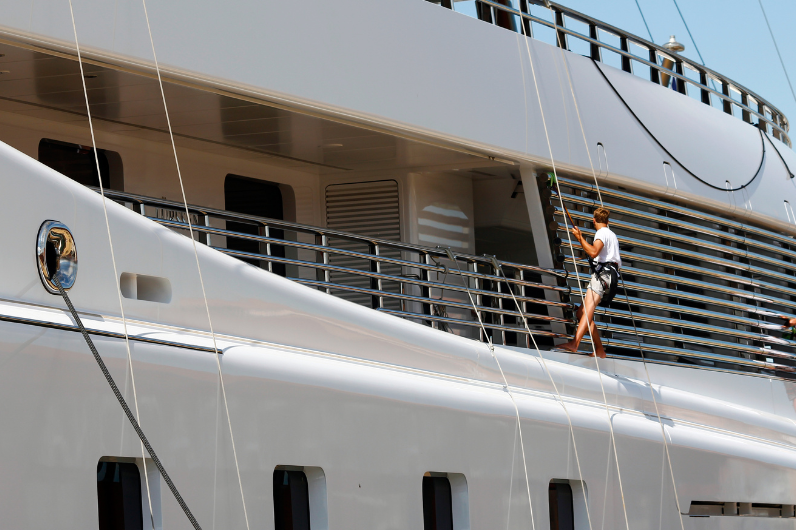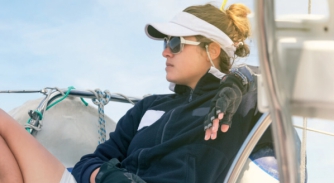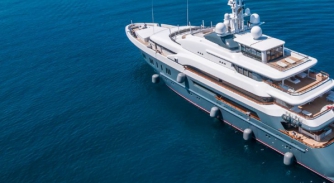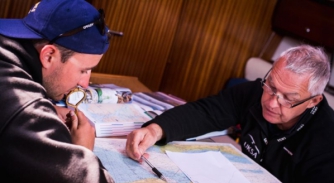UKSA funds 80% of students
The Isle of Wight-based charity has supplied an average of £12,000 per student for its Superyacht Cadetship course…

UKSA has funded around 80% of students for the September intake of its Superyacht Cadetship course. The Isle of Wight-based charity has provided over half the funding towards course fees, an average of £12,000 per student, to enable students from all backgrounds to take part in its flagship maritime training programme.
“We are committed to making careers in maritime as accessible as possible and removing any barriers to those who wish to pursue a career in the industry is something we will continue to encourage and enable,” says James Potipher, Cadetship Manager, UKSA. “This course is a fantastic alternative to university and uniquely, students earn while they learn so they can pay off their course fees while they’re working and training in the industry,”
The funding for the course was supported by Edmiston, The Seafarers’ Charity, TK Foundation, Trinity House, and Olesinski with additional funding from the Noel Lister Memorial Fund, Milo Hanlon Fund, Stephen Thomas Bursary and the Will Black Fund.
The four-year programme has 42 students starting in September, an increase of 13% increase from last year. Open to 18-25-year-olds, it is designed to train the future officers of the superyacht industry and was created alongside the Maritime and Coastguard Agency (MCA). The aim is to equip graduates with a strong foundation of knowledge and a realistic understanding of what it takes to succeed in a career in the superyacht industry.
“The course is also all-inclusive of food and accommodation during the training phases, so we’re really making it available to as many young people as possible,” adds Potipher.
Cadets also have the opportunity to undertake a Foundation Degree in Operational Yacht Science from the University of Plymouth during phases one and three of the course. This option gives additional careers and training pathways into different sectors in the maritime industry.
The programme comprises five phases; phase one will see cadets developing skills and knowledge of seamanship and safety as well as industry qualifications. Phase two sees students employed on a superyacht as entry-level deckhands and phase three progresses cadets from junior deckhand to more senior positions onboard such as lead deckhand or bosun by building on their working experience.
Phase four gives the cadets watch-keeping experience in a paid employment role which will see them practically applying and honing the techniques and practices learned. The final stage is the Officer of the Watch 3,000GT training with cadets studying senior modules towards a final examination.
Profile links
NEW: Sign up for SuperyachtNewsweek!
Get the latest weekly news, in-depth reports, intelligence, and strategic insights, delivered directly from The Superyacht Group's editors and market analysts.
Stay at the forefront of the superyacht industry with SuperyachtNewsweek
Click here to become part of The Superyacht Group community, and join us in our mission to make this industry accessible to all, and prosperous for the long-term. We are offering access to the superyacht industry’s most comprehensive and longstanding archive of business-critical information, as well as a comprehensive, real-time superyacht fleet database, for just £10 per month, because we are One Industry with One Mission. Sign up here.
Related news

ISWAN updates crew safety guidelines
The seafarer association has released a new safety resource in response to rising reports of harassment and violence
Crew

Size doesn’t fit all … but it should!
We speak candidly with current crew about their experiences of weight-based discrimination within the industry
Crew

Crew training budgets below par
Tim Clarke explains how recent survey results illustrate that yachts need to improve training options if they are going to retain quality crew
Crew

Where’s my crew at?
Yachting is proud of its maritime and navy heritage, so why isn’t there a similar approach when it comes to quality recruitment?
Opinion

UKSA reports record number of students
The maritime youth charity had over 10,000 beneficiaries in its 2022/2023 training programmes, a third of which were funded
Crew

Nautilus recovers over £2.75 million for yacht crew
Nautilus International recovered a record of over £2.75 million in unpaid wages and benefits.
Crew
Related news
ISWAN updates crew safety guidelines
2 years ago
Size doesn’t fit all … but it should!
2 years ago
Crew training budgets below par
3 years ago
Where’s my crew at?
3 years ago
UKSA reports record number of students
3 years ago
NEW: Sign up for
SuperyachtNewsweek!
Get the latest weekly news, in-depth reports, intelligence, and strategic insights, delivered directly from The Superyacht Group's editors and market analysts.
Stay at the forefront of the superyacht industry with SuperyachtNewsweek



